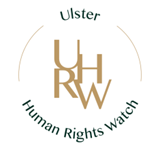Victim’s Pensions Scandal – the Principle at Fault, not just the Person
The recommendation brought forward recently by Commissioner for Victims and Survivors, Judith Thompson, that terrorists injured by their own violence should be included in pensions for troubles victims, has brought widespread condemnation from innocent victims and the organisations representing them, including Ulster Human Rights Watch. Indeed we have been vocal and clear in expressing this concern in the media and, most recently, during our meeting with NIO Minister of State, Nick Hurd MP, when we also stressed our lack of faith in government assurances on this matter, which have yet to be enshrined in legislation.
Unfortunately the position taken by Judith Thompson, while being morally indefensible, sadly is legally defensible. This is because (up to the present moment) no distinction has been made in Northern Ireland at statutory level between innocent victims of terrorist violence, and perpetrators of the same violence, who while attempting to commit mass murder may have hurt themselves in the process.
And this brings us to the crux of the matter: the legislation – namely the Victims and Survivors (Northern Ireland) Order 2006, which provides the statutory interpretation of a victim in the Troubles context. This is a legal interpretation that stands alone globally in failing to recognise the moral dimension of victimhood, and the need for victims to be acknowledged as distinct and treated differently to the psychopathic terrorists who inflicted their suffering.
In fact, it is not only inconsistent with international norms, significantly it is inconsistent with other UK legislation, including the Justice Act (Northern Ireland) 2015, which brought into force EU Directive 2012/29/EU, which establishes minimum standards on the rights, support, and protection of victims of crime, and to which all UK legislation, including the offending 2006 Order, should conform.
So at the root of all this, victims of terrorism have been granted a statutory victim definition which is not fit for purpose, and which is uniquely appalling. Commissioner Thompson has, unsurprisingly, now brought forward pension proposals in line with this approach and understandably the instant reaction to these recommendations has been for many organisations to publicly turning their fire on Commissioner Thompson, and demand her resignation.
We fully agree that Commissioner Thompson is rightly due criticism, not least for failing to recognise or to articulate effectively the legitimate disgust of victims of terrorism on being categorised together with murderers and criminals. She has also failed to advocate for the necessary review of Article 3 of the Victims and Survivors (Northern Ireland) Order 2006, to achieve a definition of victims and survivors that complies with the definition of victim of crime provided in the Justice Act (Northern Ireland) 2015 and EU Directive 2012/29/EU.
However, as Commissioner Thompson’ s contract now comes to an end (and it is unlikely that she will be reappointed for a further term, due to the obvious loss of confidence in her position by so many victims and survivors), we believe the emphasis must continue to be focused on attacking the ‘interpretation’ of ‘victim and survivor’ in the 2006 Order, and that innocent victims of terrorism focus every effort to achieve real change by campaigning to see the reform of the Victims and Survivors (Northern Ireland) Order 2006 by bringing it into conformity with the rest of the legislation in the UK and the EU directive.
Achieving reform of the Statutory Instrument 2006 would ensure any present or future Commissioner’s representations and recommendations would have to reflect a true and accurate definition of victims and survivors – perpetrators NOT included – and that is where our focus must and will remain.
Published in the Newsletter 29/08/2019. Click here to view.
